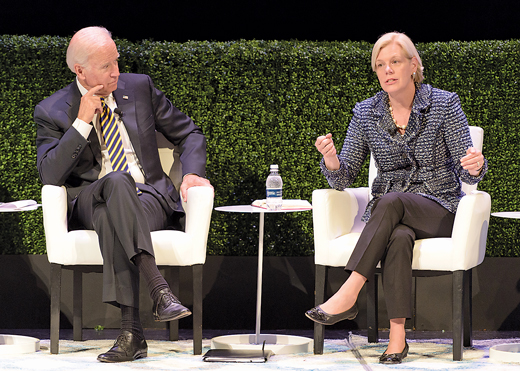Win-win solutions

OUR FACULTY | In the capital-hungry world of Silicon Valley, “going public” can be the key to fulfilling every entrepreneur’s dreams—unless it kills those dreams first.
The pressure to deliver short-term results for investors can stifle the very innovative spirit that drives startup companies, experts warned at the inaugural event of the new Biden Institute, which aims to make UD a nationally recognized leader in public policy research.
Led by former Vice President Joe Biden, AS65, the institute’s first public forum, “Win-Win: How Taking the Long View Works for Business and the Middle Class,” featured global experts from business, academia and industry. While most investors, corporate executives and boards of directors recognize the importance of taking a long view, the eight panelists largely agreed their actions often fail to reflect that. Instead, the consensus was that the fear of a poor quarterly performance causes companies to focus on short-term gains to the detriment of future growth.
Last year, in the United States, over 97 percent of corporate profits were effectively paid back in the form of shared buybacks or dividends—instead of being reinvested back in the company for productive value creation.
Mark Wiseman of BlackRock called it a “knowing vs. doing conundrum.”
“Think about it,” he said. “You’re a CEO and you tell your board, ‘Instead of giving it back to shareholders, I have this great, new idea. I want to move into a new market, but we’re not going to see return on investment for at least a decade.’ How many boards would approve that budget?”
“More than you think,” said moderator Charles Elson, professor and director of UD’s Weinberg Center for Corporate Governance.
“But fewer than need to,” Wiseman replied.
Sarah Williamson of FCLT (Focusing Capital on the Long Term) Global cited research by her organization and others that shows the value of taking a long view.
For example, she said, researchers found that companies that were managed for the long term added nearly 12,000 more jobs on average than their short-term-focused counterparts from 2001 to 2015. If all companies had performed at the long-term level, she said, more than 5 million jobs and an additional $1 trillion in gross domestic product (GDP) could have been added to the economy.
And yet “the job creators are the shareholders,” as Biden noted.
“You can’t have a strong economy without a healthy middle class, and you can’t have a healthy middle class without a labor market that both incentivizes companies to build for the long run and rewards workers when they succeed,” he said. “It comes down to what companies decide to do with their profits.”
The panel discussion was the first official event of the Biden Institute, which was established to pair the former vice president’s long-time work in domestic policy issues with UD’s interdisciplinary strengths in public policy education and research.
In introducing the discussion, Biden said an objective of the institute is to “make the University of Delaware a destination for scholars and policy makers,” who will come to campus to engage with faculty, students and the wider community.




